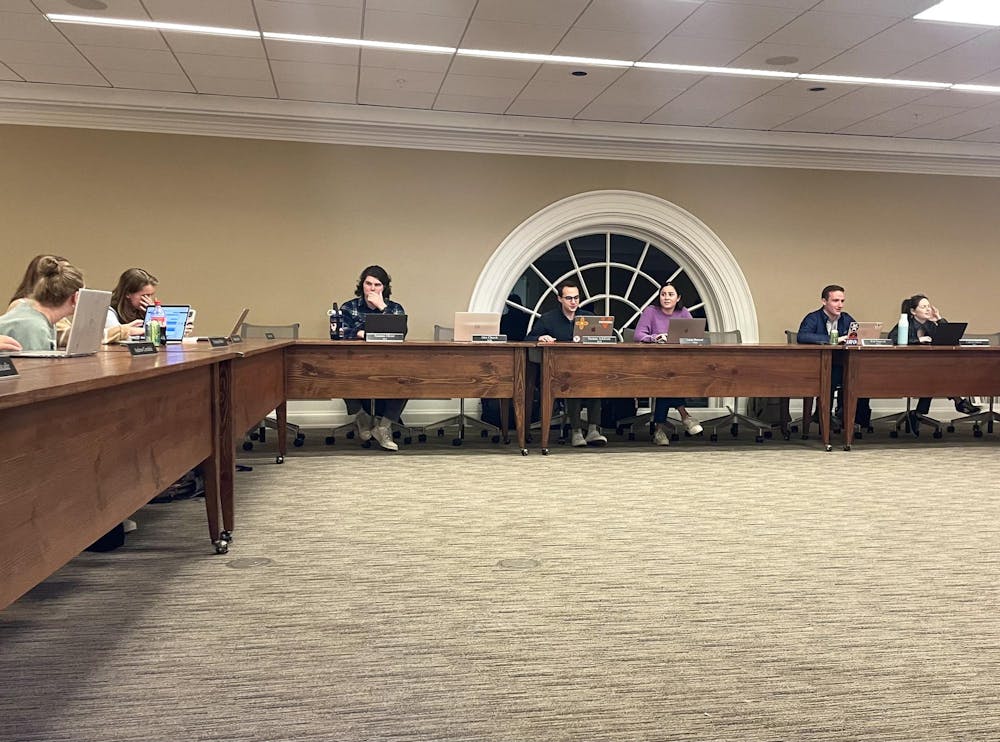The Honor Committee convened Sunday for its first meeting of the spring semester, reviewing a bylaw proposal designed to increase efficiency in case processing. The Committee plans to vote on the proposal during their next meeting Sunday. Members also discussed plans for the Committee’s annual Honor Week — a program designed to encourage students to interact with the honor system — set to take place from Feb. 9 to 14.
At the Committee’s Dec. 1 meeting last semester, Committee members shared concerns over the length of the investigation and hearing processes. Sunday’s discussion focused on a bylaw proposal that stems from two competing proposals introduced at the previous December meeting, both of which focused on solving this issue but through different methods. The proposals centered around shortening and changing investigation procedures to speed up the average 79-day timeline for case-processing.
One of these proposals, introduced by Seamus Oliver, vice chair for investigations and third-year College student, and Alex Church, vice chair for hearings and third-year Engineering student, called for removing the Investigative Panel, which reviews cases and determines whether they should proceed to a hearing. Oliver and Church proposed that they replace the Investigative Panel with a Report Panel, which would issue formal accusations earlier in the process, allowing administrative tasks like scheduling hearings to begin immediately and occur simultaneously with investigations.
The other proposal, authored by the Policies and Procedures Committee, aimed to streamline existing processes while retaining the Investigative Panel's role. To execute this, the subcommittee proposed that hearings be scheduled earlier in the process and that the Committee use simpler administrative documents.
Sunday’s proposal combined the two previous approaches while keeping the Investigative Panel but introducing changes to improve clarity and efficiency. The proposal alters hearing and investigation timelines by requiring investigators to interview reporters, students and witnesses within seven days and to promptly provide written transcripts and evidence for review.
Other proposed changes include updates to the Informed Retraction process — where students admit to having committed an Honor offense.
One such update reduces the submission timeline after receiving an IR letter from an Honor Advisor. IR letters detail alleged offenses and procedural steps. The proposed system gives students up to 96 hours to submit an IR intent form — a formal decision on whether or not they are filing an IR. Once submitted, a 10-day clock would begin for students to complete the process.
For students who do not choose to file an IR within the 96-hour period, their case will move immediately into the investigation phase. If this proposal is implemented, cases where students have no intent to file an IR will move to the investigation stage much faster, and case-processing steps can take place without further stalling.
Under the current system, students' intent to submit an IR is often unclear, and they are able to wait the full seven-day period without making a decision. The new proposal aims to distinguish between cases moving to an investigation and those resolved under an IR more quickly, through introducing the IR intent form.
Oliver said that this process seeks to streamline decision making during the 10-day period, where a submitted intent form will allow case-processing to resume for investigation and non-investigation cases.
“We can get students who intend to submit the IR and wish to do so, done in the same amount of time … while moving cases where the student has no intention of taking the IR into investigations substantially faster,” Oliver said.
Students are also required to specify hearing preferences, such as panel composition and hearing type, earlier in the process to expedite scheduling and reduce delays.
Will Hancock, vice chair for the undergraduate community and third-year College student, said that the new proposal brought together valuable aspects from the competing December proposals as well as creative additions from Committee members.
“I think this really ended up working, and a lot of that was some of the ingenuity or openness to the new [IR form] idea,” Hancock said. “That wasn’t included in anyone’s plan in December … coming in with some new ideas really allowed us to [pull] good values from each of [the plans].
The Committee has a week to consider the proposal and will vote on it at their next meeting.
The Committee also opened a brief discussion on Honor Week, a week aimed at boosting student engagement with and discussion about the honor system. The week was held for the first time last year where it included a catered dinner, an art competition and a raffle. However, more comprehensive details about specific events have not yet been provided for this year’s Honor Week.
The Committee will reconvene Sunday at 7 p.m. to further discuss Honor Week initiatives.
CORRECTION: A previous version of this article incorrectly stated that the current Informed Retraction period is 10 days. The IR period is actually seven days, and the proposed change is to make it 10 days. The article has been updated to reflect this change.
A previous version of this article incorrectly stated that the Investigative Panel raised the threshold to two-thirds from a simple majority. The proposed and current system both require a simple majority, as the Panel consists of three members.. The article has been updated to reflect this change.







